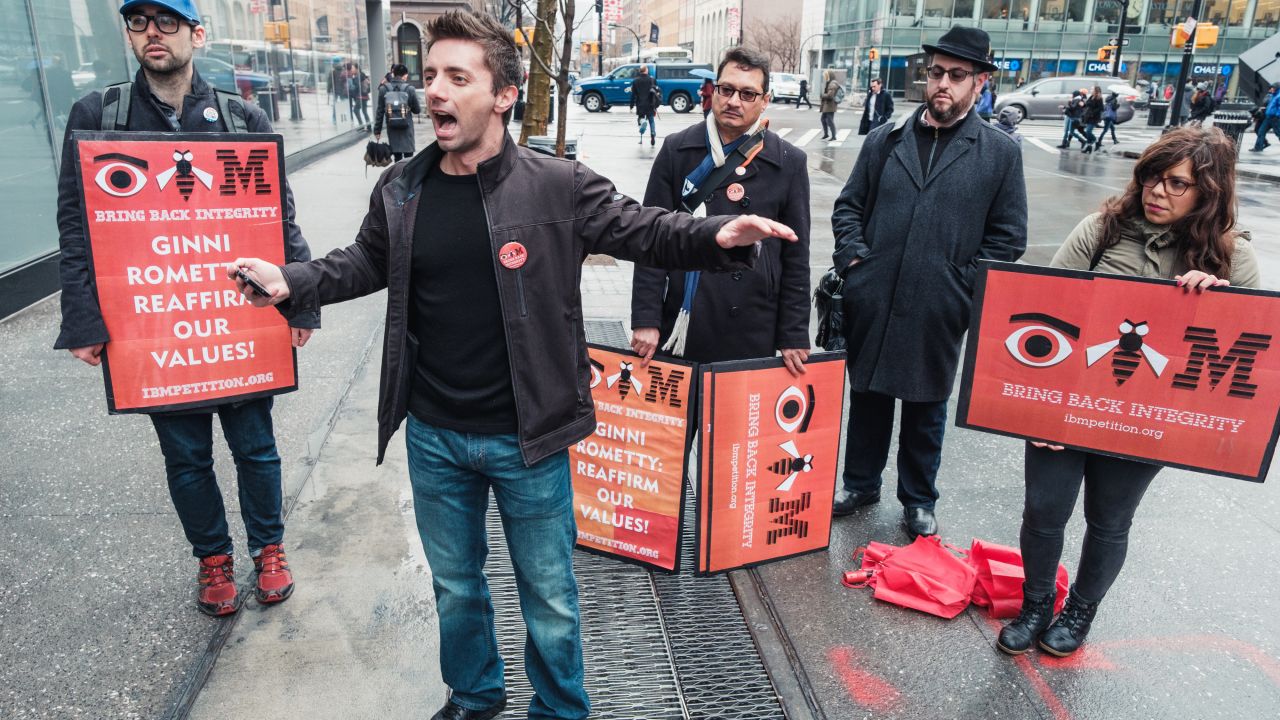
Daniel Hanley speaks while IBM colleagues look on at the New York petition delivery event in New York on March 28, 2017. (Photo courtesy of Coworker.org)
This Q&A is part of Sarah Jaffe’s series Interviews for Resistance, in which she speaks with organizers, troublemakers and thinkers who are doing the hard work of fighting back against America’s corporate and political powers.
The tech industry likes to maintain a progressive reputation, even though some of its policies increase inequality across the country. Yet after Donald Trump’s election, tech executives lined up to express willingness to work with Trump’s administration. For tech employees, this disconnect between the values the companies preach in public and the values Trump expressed has led them to begin organizing in their workplaces, demanding that their employers not collaborate with the president and using this moment as an opportunity to push the companies to live up to those values of diversity and inclusion.
In this edited interview, I speak with Daniel Hanley, a software engineer at the corporate tech giant IBM, who is part of group of internal employees who have just begun such a campaign.
Sarah Jaffe: Let’s go back to the beginning and talk about how this campaign got started at IBM.
Daniel Hanley: I would say it was prompted by Ginni Rometty’s letter to Donald Trump on Nov. 16. She said many things in it, but among them she praised his plans for corporate tax breaks and congratulated him on his election. Then she pledged to collaborate on certain areas, [which] included government infrastructure and security, which concerned many people.
IBM, to its credit, asked people to provide feedback on our internal blog. The response was quite incredible. I have been working at IBM for over 10 years and have never seen anything like it. People spoke up and most comments were expressing disappointment, saying things like, “Ginni, what about our values? What about diversity, inclusion, respect? Donald Trump represents the opposite of all of these values to us. At least you could have clarified the extent to our participation in the Trump administration.”
Other people were more scathing in their criticism. They said things like, “If we look at IBM’s history, IBM dealt with Nazi Germany to sell products and services that identified Jews during the Holocaust for extermination. IBM dealt with the apartheid regime in South Africa. So, now, after reading this letter, we are concerned that IBM might do it all over again if they could make some profit and get away with it.”
According to IBM’s business conduct guidelines, we can’t do any deals with Trump businesses now that he is president. Some people also called for a clarification on that.
IBM didn’t give an adequate response to the concerns that people addressed. I was quite moved seeing so many of my colleagues express these values, standing up for them, even against the company’s CEO. Seeing that was one of my proudest moments working at IBM.
After our responses were basically ignored, many of us got together and decided to organize into a collective voice that can’t be ignored by IBM executives.
We used the Coworker.org platform to draft a petition. It was put together by a team of IBMers from different perspectives and from different parts of the company. We got feedback from about 50 employees who eventually signed on to the petition. At that point, we went public with it.
SJ: Tell us about the organizing process there and how that has grown since the petition went public. You have gotten quite a lot of signatures from IBM workers.
DH: Yes, the organizing process is quite challenging, as it is for tech workers everywhere, I think, as many of these workplaces are geographically distributed and a lot of people aren’t in the office. But with the core group that we had signing on, and also the media attention we got from the Intercept article and social media as well, we were able to reach out to more and more IBM employees.
We reached out to about 500 IBM employees who had criticized Ginni Rometty’s letter on Facebook, LinkedIn and other platforms. A lot of them signed the petition. Among those, we tried to recruit a core organizing team in various IBM office locations. Now we have weekly conference calls with about two dozen people around the country. We are trying to form the basis of an organization that can hold IBM accountable to our values.
The first demand of the petition is for IBM to respect our right to refuse any participation in any illegal Trump project that violates the civil liberties of immigrants, Muslims, women, the LGBT community and marginalized groups in general.
The second is we want IBM not just to talk about diversity and inclusion, but take concrete steps in response to Trump’s election to show that we value inclusion by expanding the diversity recruitment program.
Third, we want IBM to clearly sever all ties with Trump-related business entities. We don’t want the next IBM InterConnect 2018 conference to be held at a Trump hotel. I looked on IBM’s internal website for employee discounts and we are being offered a discount at a Trump hotel in Miami. We think a clarification on the business conduct guidelines is in order.
Editor’s note: The full list of demands is online at IBMPetition.org.
SJ: One of the things I wanted to ask was how this connects with the internal working conditions at IBM. That when we are talking about the company’s values, mostly we see those values expressed in how the workers are treated.
DH: All these demands are related to workplace issues. We don’t want it to be legal and we don’t want to be responsible for harming our own communities with any Trump project the way Palantir is being asked to do so right now. Our argument is, that these empty, hollow corporate statements never adequately embody the values of the people who do the work at IBM, the people who innovate. We express our values, because corporate statements are always going to be motivated, at the end of the day, by the pursuit of profit, the pursuit of these lucrative Trump government contracts.
SJ: A friend of mine who is a reporter based in the Bay Area was talking about looking up the political contributions from tech industry employees and then tech industry leadership or tech industry political action communities, things like that, and the difference between the values of young workers in these industries and the people at the head of their companies. There is often quite a gap there. I wonder if you could talk about this in the broader conversation about the tech industry and the tech workforce and a lot of the other issues that tend to swirl around that like economic inequality and gentrification. It seems that the Trump election is leading the tech workforce to step out from under the shadow of its bosses and really take a political stand.
DH: I think it is important to understand our campaign in the broader context of the tech industry. At last month’s “speak-out” event in Atlanta, the largest group present were IBMers speaking out, but we were joined by community supporters, some of whom were involved in local tech solidarity meet-ups.
We are seeing these tech solidarity groups pop up all over the country, including the Tech Stands Up group and the Tech Workers Coalition. What is really exciting for us is that our own campaign has inspired a sister campaign over at Oracle calling on its own CEO to join the amicus brief in opposition to the Muslim ban. This is definitely not just happening in a vacuum, but we are seeing tech consciousness arising here.
I want to go back to something else you said about millennial workers, who were appalled by Trump’s racism, xenophobia and Islamophobia. What I learned from internal sources involved in human resources and involved in recruitment from the open source community, they are saying that now their jobs are much more difficult because of Ginni Rometty’s proximity to Trump and her refusal to clarify the relationship or strong opposition to any project that violates civil liberties. Younger potential recruits are feeling alienated.
SJ: You have not heard anything from Rometty or from the higher ups so far, correct?
DH: No, we haven’t heard any adequate response to our demands. She did write a statement about the Muslim ban, but I would not call this an adequate response. Many members of our campaign were very critical of it. It did not, to my knowledge, pacify anybody. There were a couple of differences. For one thing, until the letter was leaked (maybe deliberately) to TechCrunch, it was an internal letter. It was wasn’t written as a public letter like her letter to Trump. That is one thing.
Another thing is, that internal forum I referenced earlier where people could discuss and debate the issues, it was shut down. There was no comment section [included] with her most recent statement and we think that was deliberate, as well. The thing that struck me the most though was the content of her letter. For one thing, she portrayed this debate as a struggle between “openness versus security.” I think that is very harmful. Portraying the Muslim ban as a security measure is not factual. It is misleading. A federal court observed that there is no security justification for the ban and [so] calling it a ‘security measure’ is wrong. It is an Islamophobic and discriminatory measure.
SJ: Anything else that people should know about this campaign?
DH: It is very heartening to see other tech workers take action elsewhere. We strongly support things like the Never Again Pledge, which is an alliance of workers among many companies making a broad statement of principles that never again are we going to use our role in these companies to sell technologies like the punch card machines to the Nazis. That broad statement of principles is very, very powerful, but, at the end of the day, in our own workplaces we have leverage to submit policy changes like those that IBMPetition.org has proposed to their company’s executives. We think this is a successful model. I feel validated when people at Oracle and elsewhere adopt it, as well.
SJ: How can people keep up with the campaign?
DH: You can go to IBMPetition.org and sign on as a supporter, but we also have a Facebook page, also called IBMPetition.org.
Sarah Jaffe also spoke with longtime IBM worker Sesha Baratham, who is another organizer on the IBM petition. You can read her full interview at In These Times.
Interviews for Resistance is a project of Sarah Jaffe, with assistance from Laura Feuillebois and support from the Nation Institute. It is also available as a podcast on iTunes. Not to be reprinted without permission.




